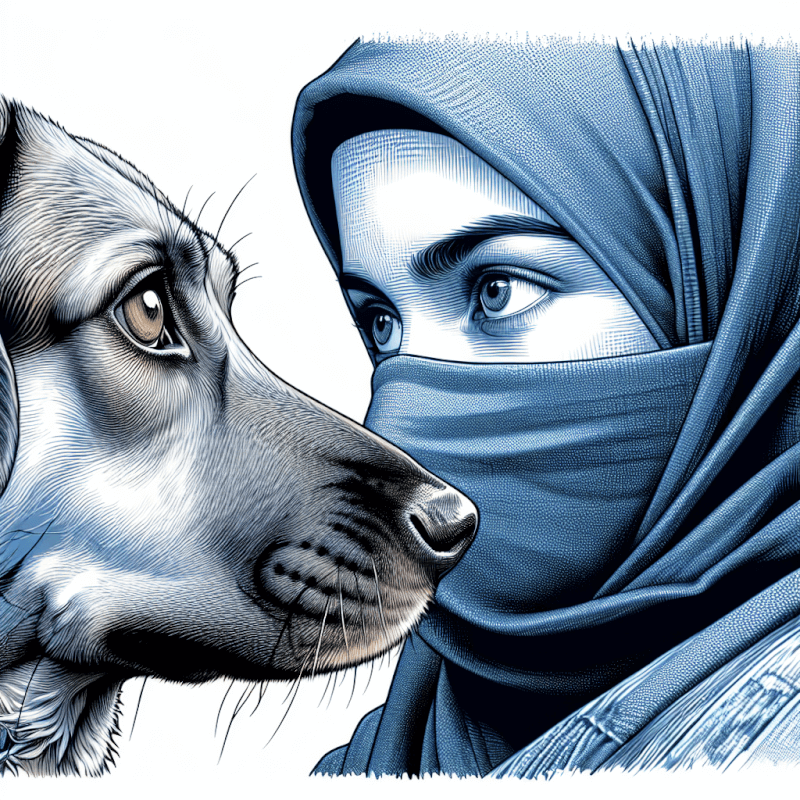If you’re a dog owner looking for effective and reliable solutions to your furry friend’s behavioral issues, then a dog training veterinary behaviorist might be the answer you’ve been searching for. Combining the expertise of a veterinarian with specialized training in animal behavior, these professionals offer a holistic approach to understanding and addressing your pet’s specific needs. From basic obedience training to more complex behavioral problems, a dog training veterinary behaviorist can provide you with the guidance, support, and tools necessary to ensure a happy and well-behaved canine companion. With their compassionate and knowledgeable approach, they can help foster a stronger bond between you and your four-legged family member, creating a harmonious and fulfilling relationship for years to come.
What is a Dog Training Veterinary Behaviorist?
A dog training veterinary behaviorist is a professional who specializes in addressing and modifying behavior issues in dogs. They are highly qualified individuals who have a deep understanding of canine behavior and the psychology behind it. Their primary goal is to help dog owners improve their dog’s behavior and solve any behavioral problems through specialized training techniques and behavior modification programs.
Ready for Cat Trivia?
Test your knowledge about cats!

Definition
A dog training veterinary behaviorist is a veterinarian who has obtained additional training and certification in the field of veterinary behavior. They have in-depth knowledge of dog behavior and psychology, allowing them to provide comprehensive and effective training solutions for dogs with behavior issues. These professionals work closely with dog owners to develop personalized behavior modification plans and implement training techniques to address and resolve problematic behaviors in dogs.
Qualifications
To become a dog training veterinary behaviorist, one must first hold a veterinary degree. This means completing a Bachelor’s degree in veterinary medicine and then obtaining a Doctor of Veterinary Medicine (DVM) or a Veterinary Medical Doctor (VMD) degree. After completing their veterinary education, these individuals undergo several years of specialized training and education in the field of veterinary behavior. This includes completing a residency program under the supervision of experienced veterinary behaviorists and passing comprehensive examinations to obtain certification in veterinary behavior.
Role
The role of a dog training veterinary behaviorist is to assess and diagnose behavior problems in dogs and provide treatment plans tailored to each individual dog’s needs. They work closely with both the dog and the owner to implement behavior modification techniques and training programs. Dog training veterinary behaviorists also collaborate with veterinarians and dog trainers to ensure comprehensive care for the dog. Their primary focus is to improve the dog’s behavior, enhance the bond between the dog and the owner, and ultimately improve the overall quality of life for both.
When to Consult a Dog Training Veterinary Behaviorist
Behavior problems in dogs can range from mild issues to severe and potentially dangerous problems. It is often challenging for dog owners to assess the severity of these issues and decide when professional help is required. Consulting a dog training veterinary behaviorist is recommended in the following situations:
Behavior Problems
If your dog is displaying behavior problems such as excessive barking, destructive chewing, or inappropriate elimination, it may be time to consult a dog training veterinary behaviorist. These professionals have the expertise to assess the underlying causes of such behaviors and design specific behavior modification plans to address them.
Aggression Issues
Aggression problems in dogs can be very concerning and pose a risk to both the dog and people or other animals around them. If your dog displays signs of aggression, such as growling, lunging, or biting, it is crucial to seek professional help from a dog training veterinary behaviorist. They can evaluate the triggers and underlying causes of the aggression and develop a comprehensive behavior modification plan to manage and modify the aggressive behavior.
Anxiety and Fear
Dogs can experience anxiety and fear in various situations, such as separation anxiety, fear of loud noises, or fear of specific objects or situations. These anxieties can greatly affect the dog’s quality of life and overall well-being. A dog training veterinary behaviorist can help identify the triggers of anxiety and fear and develop strategies to desensitize the dog and reduce their fearful response.
Compulsive Behavior
Compulsive behaviors in dogs, such as excessive licking, tail chasing, or repetitive pacing, can indicate underlying emotional or psychological issues. It is important to consult a dog training veterinary behaviorist to understand the underlying causes of these behaviors and develop appropriate behavior modification plans to manage and reduce compulsive behavior.

The Importance of Training for Dogs
Training plays a crucial role in a dog’s life and is essential for both their well-being and the harmonious relationship between dogs and their owners. Here are some key reasons why training is important for dogs:
Promotes Positive Behavior
Training helps dogs understand what behaviors are expected of them and what is not acceptable. Through positive reinforcement and reward-based training methods, dogs learn to exhibit desirable behaviors and avoid unwanted actions. This promotes positive behavior and helps create a well-behaved and obedient dog.
Helps in Controlling Unwanted Actions
Unwanted behaviors such as jumping on people, pulling on the leash, or excessive barking can be a source of frustration and inconvenience for dog owners. Training provides effective tools and techniques to address and control these unwanted actions. By teaching dogs appropriate alternatives and redirecting their behavior, training helps owners manage and eliminate unwanted actions.
Enhances Communication between Dog and Owner
Training allows dogs and their owners to develop clear and effective communication. Through training, dogs learn to understand verbal and non-verbal cues from their owners, making it easier for them to respond to commands and instructions. This enhances the bond between dogs and their owners, leading to better cooperation and a stronger relationship.
Understanding Canine Behavior
To effectively train dogs and address behavior issues, it is important to have a comprehensive understanding of canine behavior. Dogs have complex behavior patterns influenced by natural instincts, genetic drives, and their social environment. Here are some key aspects of canine behavior to consider:
Natural Behaviors
Dogs have certain natural behaviors that are instinctual and innate. These behaviors include territorial marking, scent tracking, playing, and hunting. Understanding and respecting these natural behaviors is essential in designing training programs that work with a dog’s instincts rather than against them.
Instinctual Drives
Instinctual drives in dogs, such as prey drive and social hierarchy, heavily influence their behavior. Prey drive refers to a dog’s natural instinct to chase and capture prey, while social hierarchy drive relates to the dog’s need for structure and social order within their pack. Recognizing and channeling these instinctual drives appropriately can help modify and control certain behaviors.
Reactive Responses
Dogs may exhibit reactive responses in certain situations, such as fear or aggression. These responses are often triggered by specific stimuli or past negative experiences. Understanding the triggers and underlying causes of reactive responses is crucial in addressing and modifying these behaviors.
Social Behavior
Dogs are social animals and have complex social behaviors. They form social bonds with other dogs and humans, and their behavior can be influenced by social factors. Understanding the social behavior of dogs is important in addressing issues such as separation anxiety, fear of strangers, and dog-to-dog aggression.

Methods Used by Dog Training Veterinary Behaviorists
Dog training veterinary behaviorists use a variety of techniques and methods to modify behavior and train dogs effectively. These methods are based on scientific principles of learning and behavior and focus on positive reinforcement and humane training practices. Here are some common methods used by dog training veterinary behaviorists:
Positive Reinforcement
Positive reinforcement is a training technique that rewards desired behaviors with praise, treats, or other rewards. By reinforcing positive behaviors, dogs learn to associate those behaviors with positive outcomes, making them more likely to repeat the desired behavior in the future. This method promotes learning through positive experiences and avoids the use of punishment or aversive techniques.
Counterconditioning
Counterconditioning is a technique used to change a dog’s emotional response to a specific stimulus or situation. It involves pairing the trigger with a positive or neutral experience to create a more positive association. This method is often used to address fears and phobias in dogs, helping them overcome their anxieties and develop more appropriate responses.
Desensitization
Desensitization is the process of gradually exposing a dog to a specific stimulus or situation in a controlled and systematic manner. This technique is commonly used to reduce reactivity and fear in dogs by gradually increasing their tolerance and comfort level. By exposing dogs to the triggers at a manageable intensity, they learn to remain calm and relaxed in the presence of the previously feared stimulus.
Cognitive Therapy
Cognitive therapy focuses on modifying the dog’s thoughts and perceptions to change their behavior. This approach aims to identify and challenge negative thought patterns or beliefs that contribute to problematic behaviors. By altering their cognitive processes, dogs can develop more positive and adaptive behaviors.
Common Training Issues Addressed by Veterinary Behaviorists
Dog training veterinary behaviorists address a wide range of training issues and behavior problems in dogs. Here are some common issues that they can help with:
House Training
House training is one of the first and most essential skills that dogs need to learn. It involves teaching dogs where to eliminate and how to hold their bladder and bowels appropriately. Dog training veterinary behaviorists can provide guidance and strategies to effectively house train dogs and address any challenges or setbacks.
Leash Pulling
Leash pulling is a common issue during walks and can be a source of frustration for dog owners. Dog training veterinary behaviorists can develop training techniques and strategies to teach dogs to walk politely on a leash without pulling. By using positive reinforcement and reward-based methods, dogs learn to walk comfortably and calmly on a leash.
Excessive Barking
Excessive barking can be a nuisance and disrupt the peace and quiet in a household. Dog training veterinary behaviorists can help identify the triggers of excessive barking and develop strategies to reduce and control this behavior. Through behavior modification techniques, dogs learn to bark less frequently and respond appropriately to specific stimuli.
Separation Anxiety
Separation anxiety is a common issue in dogs and can result in destructive behaviors, excessive vocalization, and distress when left alone. Dog training veterinary behaviorists can develop behavior modification programs to help dogs overcome separation anxiety and become more comfortable being alone. By gradually increasing the duration of separation and providing appropriate mental and physical stimulation, dogs can learn to cope with being alone.

The Training Process
The training process with a dog training veterinary behaviorist typically involves the following steps:
Initial Consultation
The initial consultation is the first meeting between the dog owner and the veterinary behaviorist. During this consultation, the behaviorist will gather information about the dog’s behavior, history, and any specific concerns or issues. This allows them to understand the context and develop a customized behavior modification plan.
Assessment of Behavior
After the initial consultation, the veterinary behaviorist will conduct a thorough assessment of the dog’s behavior. This may include observing the dog’s interactions, conducting behavioral tests, and gathering additional information from the owner. The assessment helps identify the underlying causes and triggers of the dog’s behavior problems.
Development of Behavior Modification Program
Based on the assessment, the veterinary behaviorist will develop a behavior modification program tailored to the specific needs of the dog. This program may include a combination of training techniques, behavior management strategies, and environmental modifications. The behavior modification program aims to address the underlying causes of the behavior problems and teach the dog alternative, more appropriate behaviors.
Training Sessions and Progress Monitoring
Once the behavior modification program is developed, the dog owner will attend training sessions with the veterinary behaviorist. These sessions involve hands-on training and coaching to teach the owner how to implement the behavior modification techniques effectively. The behaviorist will monitor the dog’s progress and make adjustments to the training plan as needed. Regular follow-up sessions may be scheduled to track the dog’s progress and address any challenges or setbacks.
Collaboration with Veterinarians and Dog Trainers
Dog training veterinary behaviorists often collaborate with other professionals, such as veterinarians and dog trainers, to ensure the best outcome for the dog and the owner. This collaborative approach provides holistic care and takes into account any medical, physical, or training-related factors that may contribute to the dog’s behavior problems. Here are some key aspects of collaboration:
Working Together for the Best Outcome
Veterinarians and dog trainers collaborate closely with dog training veterinary behaviorists to provide comprehensive care for dogs with behavior issues. By sharing information and working together, these professionals can develop an integrated approach that addresses all aspects of the dog’s well-being.
Combined Efforts for Holistic Care
Veterinarians focus on the medical aspects of the dog’s well-being, treating any underlying health conditions that may contribute to behavior problems. Dog trainers specialize in teaching dogs basic obedience skills and training them for specific tasks. Dog training veterinary behaviorists bring their expertise in behavior modification and training for behavior issues that go beyond the scope of basic obedience training. By combining their efforts, these professionals can provide a holistic approach to address the dog’s behavior problems effectively.

The Cost of Dog Training Veterinary Behaviorists
The fees and expenses associated with consulting a dog training veterinary behaviorist can vary depending on several factors, including the location, qualifications, and experience of the behaviorist. It is important to consider the following aspects when assessing the cost:
Fees and Expenses
Dog training veterinary behaviorists typically charge an initial consultation fee, which covers the assessment of the dog’s behavior and the development of a behavior modification plan. Subsequent training sessions or follow-up consultations may incur additional fees. It is essential to discuss the fee structure and any potential additional expenses with the behaviorist before starting the training process.
Value for Money
While the cost of consulting a dog training veterinary behaviorist may vary, it is important to consider the value for money that their services provide. These professionals have extensive knowledge and experience in addressing behavior problems in dogs and can provide tailored training programs that address the underlying causes of the issues. The long-term benefits of resolving behavior problems and improving the overall quality of life for the dog and its owner often outweigh the initial costs.
Choosing the Right Dog Training Veterinary Behaviorist
When selecting a dog training veterinary behaviorist, it is important to consider the following factors to ensure the best fit for both the dog and the owner:
Credentials and Certifications
Check the behaviorist’s credentials and certifications to ensure they have obtained the necessary education and training in veterinary behavior. Look for certifications or affiliations with reputable organizations such as the American College of Veterinary Behaviorists or the Animal Behavior Society.
Experience and Expertise
Consider the behaviorist’s experience and expertise in dealing with behavior problems similar to those of your dog. Ask about their previous cases and success rates in resolving behavior issues. An experienced behaviorist will have a broad knowledge base and a range of effective techniques to address different behavioral challenges.
Compatibility and Personal Approach
Choose a behaviorist with whom you feel comfortable and who has a personal approach that aligns with your training philosophy and goals. Building a good rapport and trust with the behaviorist is crucial for the success of the training process. Ask for references or read testimonials from previous clients to gain insight into their professionalism and client satisfaction.
In conclusion, a dog training veterinary behaviorist is a highly qualified professional who specializes in addressing and modifying behavior issues in dogs. They play a vital role in improving the behavior, well-being, and overall quality of life for dogs and their owners. By understanding canine behavior, implementing effective training techniques, and collaborating with other professionals, dog training veterinary behaviorists provide comprehensive care and solutions for dogs with behavior problems. Choosing the right behaviorist can make a significant difference in the success of the training process and the overall behavior of your furry companion.



